

Most ebook files are in PDF format, so you can easily read them using various software such as Foxit Reader or directly on the Google Chrome browser.
Some ebook files are released by publishers in other formats such as .awz, .mobi, .epub, .fb2, etc. You may need to install specific software to read these formats on mobile/PC, such as Calibre.
Please read the tutorial at this link: https://ebookbell.com/faq
We offer FREE conversion to the popular formats you request; however, this may take some time. Therefore, right after payment, please email us, and we will try to provide the service as quickly as possible.
For some exceptional file formats or broken links (if any), please refrain from opening any disputes. Instead, email us first, and we will try to assist within a maximum of 6 hours.
EbookBell Team

4.1
70 reviewsThis volume draws a map of British film culture in the 1970s and provides a wide-ranging history of the period. It examines the cross-cultural relationship between British cinema and other media, including popular music and television. The analysis covers mainstream and experimental film cultures, identifying their production contexts and the economic, legislative and censorship constraints on British cinema throughout the decade.
The essays in Part I contextualise the study and illustrate the diversity of 1970s moving image culture. In Part II, Sue Harper and Justin Smith examine how gender relations and social space were addressed in film. They show how a shared visual manner and performance style characterises this fragmented cinema, and how irony and anxiety suffuse the whole film culture. This volume charts the shifting boundaries of permission in 1970s film culture and changes in audience taste.
This book is the culmination of an AHRC-funded project at the University of Portsmouth, For more information about 1970s British Cinema, Film and Video: Mainstream and Counter-Culture (2006-2009) please visit the project website at www.1970sproject.co.uk.